Brazilian Geotechnical Sector: Alphageos Tecnologia Aplicada
Ruy Thales Baillot, Director and Founder of Alphageos Tecnologia Aplicada
Ruy Thales Baillot gives an overview of the Brazilian geotechnical sector and talks about the history of Alphageos, mentioning technology, success cases, current projects, growth, challenges to be faced and his vision for the future of the company.
Interview with Ruy Thales Baillot, Director and Founder of Alphageos Tecnologia Aplicada
Alphageos works in geological investigation. What is your evaluation of the geotechnical sector in Brazil at the moment?
The geotechnical sector in Brazil now is quite an advanced sector and one that has developed a lot. Today the Brazilian geotechnical sector is well positioned globally. This may be a result of the strong demand over many years that Brazil has had for this sector. I certainly think that this is a very propitious and developed sector here. There are associations like the ABMS (the Brazilian Association for Soil Mechanics and Engineering) and the ABGE (the Brazilian Association of Geological and Environmental Engineering) which have always brought a lot of experience and knowledge from abroad and who today are able to pass on our knowledge and experience to other countries.
The civil construction sector that we deal in has excellent potential. There is so much to be built in Brazil. We need highways, ports, airports, schools, buildings, etc. Thus, it is a very promising field for those that are willing to make the most of it.
Can you tell us a bit about the history of Alphageos?
Alphageos came about from a dream that I had when I was practically retired. In those years people retired at a relatively young age. When I was 45 or 46, I retired and I founded this company. I built it up from practically nothing but with a lot of experience. Today the company has been active for 28 years, and we have developed incredibly. The market has been favourable and the company´s employees all have excellent experience. I live a very happy life! We haven’t had many low points, we have always had high and medium points.
Your company has been listed as one of the 250 small and medium sized companies showing the greatest growth in Brazil. How do you explain this growth?
This growth is very much a result of our extensive experience. When the company was founded, we were already quite senior and we differentiated ourselves from what was already present in the market. The two main partners had worked for many years in project development companies and so they really knew a lot about the difficulties that people had in receiving this kind of data. When we presented our company and our service, we tried to supply all of the services that we knew were not available or difficult to find. The market was very receptive and remains so today. We really tried to present a very different service.
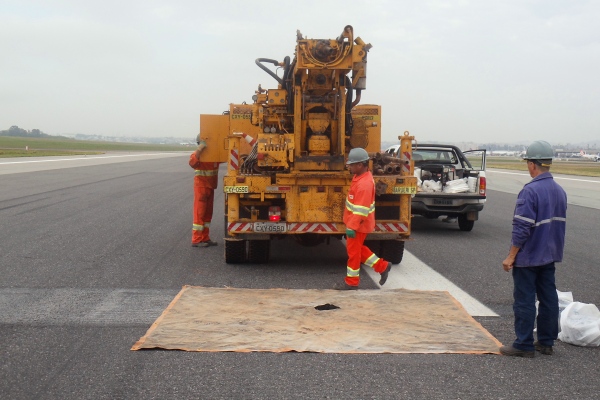
In this respect, you have some very innovative technologies…
Yes, along with our years of experience we really tried to bring to Brazil the most developed technology from around the world. The company has a registered brand. This brand is the only one that is used in some sectors today. We do have some competitors who are trying to follow in our footsteps, which is in fact really good. However, we remain in a position of distinction in the market. We bring state of the art technology to Brazil. Borehole imaging is a revolutionary technology that we brought to Brazil 14 years ago. We also use the CPT (cone penetration test). We are even bringing in and using technology and equipment that does not yet exist in Brazil. Our company stands out in Brazil and even internationally.
You must have many success cases to share with us.
Yes quite a few indeed. We are working on the tunnel from Guarujá to Santos. This is a magnificent project and we have done all of the geotechnical work for this project. In fact, we are still working on it with the supervision of Brazilian project development companies and with Dutch assistance. This involves a technology that is very interesting and that has not been used much here in Brazil yet. With this project, we have really been able to stand out in the Brazilian geotechnical sector. We are also well experienced in auditing project quality. We have been working for more than 10 years in this sector where we are also quite innovative. We are often contracted by investment companies, investors and private owners so that they can have a guarantee that everything is being done correctly and with quality without having to rework their service. This very interesting sector is also doing very well.
Can you tell us about your international activities?
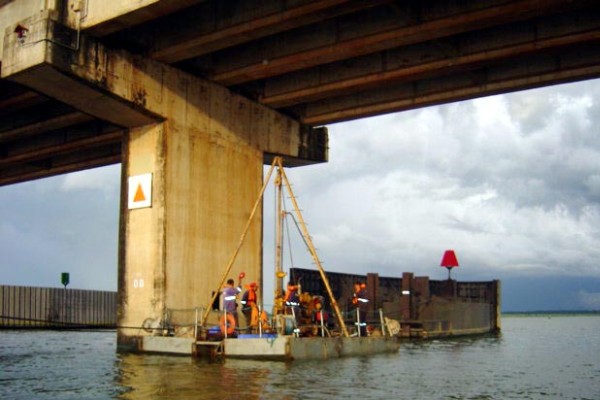
We are working in Chile, on an 18km tunnel. We have proposals to work in Africa, for example in Ghana and Angola. We also wish to work in Panama. We are looking forward to the outcome of this in order to internationalise our services a bit more.
How do you approach corporate social responsibility?
We are an honest company that follows the rules and doesn’t try to avoid income tax or anything like that. We give a domestic service that we think is of good scope particularly for our employees. We help to pay for university courses for all of our employees and we help cultivate the skills of our key employees. We also work to help with some associations, for example,we work with an association that helps with transport for children that are suffering from cancer.
What are the main challenges that your company faces?
There are always challenges because the technology is constantly evolving. Our challenge is to be up to date with the technology and to stand out not only nationally but also internationally. There are challenges every day.
This sector is relatively new in Brazil but it has attracted a lot of foreign investment. Are you open to any potential partnerships?
Without a doubt. The civil construction sector that we deal in has excellent potential. There is so much to be built in Brazil. We need highways, ports, airports, schools, buildings, etc. Thus, it is a very promising field for those that are willing to make the most of it. Today, Brazil is undoubtedly a global point of interest. We have a very attractive culture for international investment, perhaps more so than some other potential locations. We are a joyful population.
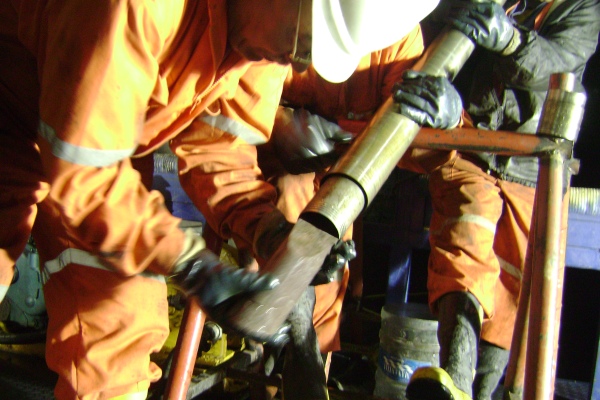
If a company were interested in some kind of fusion, would you be interested?
Yes. We have already carried out successions and today we are working in association with a German company to develop some new state of the art technology for a trial that will be specialised to determine the residual extensions in the rocks for when you wish to carry out very deep excavations. This technology has so far only really been dominated in a couple of places in the world. Thus, we are in association with this German company in order to be able to bring this technology to Brazil so that we can also dominate it. This is a very attractive technology because it is extremely specialised and it is a challenging technology that really catches people´s eye. We have a good relationship with this German company; the association is quite developed.
Therefore, in general, are these partnerships mostly in terms of technological partnerships?
It´s one thing to read about how to do something, but it´s another thing to know how to do it. It´s hard to dominate a particular sector despite having access to much of the literature about that sector if you don’t have experience. Especially in this kind of activity, it is very important that you have used these technologies at least once. You don’t want to have to reinvent the wheel. You have to use existing technology, adopt it and if possible improve it.
Over the last few years, Alphageos has participated in many of the most important developments and constructions in the country. Can you tell us a bit about some of these projects?
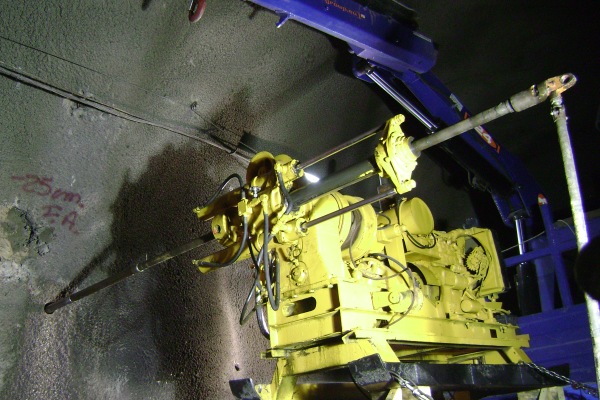
In some way or another, to different extents, we have participated in almost all of the most important projects that have been developed over the last 20 years in Brazil. For example, we participated in the elimination of pollution from the river Tiete with Sabesp in the state of Sao Paulo. We have worked with Petrobras in Macae and are continuing to work with them in that area. We have worked with Petrobras on many projects. We work on many projects with Vale, one of which is the duplication of the Carajas railroad. We have also provided our services on projects for airports such as the Guarulhos airport in Sao Paulo. We have worked on various lines of the Sao Paulo metro; in fact, we have had the pleasure to work on the development of practically all of the metro lines. We also worked on the development of both metro lines in Rio de Janeiro. We are still now working on this project to a lesser extent. We also worked on the transposition of the River Sao Francisco. We have worked on some important port projects from the port of Rio Grande do Sul to the port of Rio Grande for Petrobras. We have worked on the ports of Paranagua, Sao Sebastiao, Santos, Rio de Janeiro and Sepitibe. We worked for four years of the Sudeste Port. Thus, we have participated on a significant level in all of the most important developments and projects in the country in recent years.
Checking the subsoil is important for property development projects. Do you also work in this area?
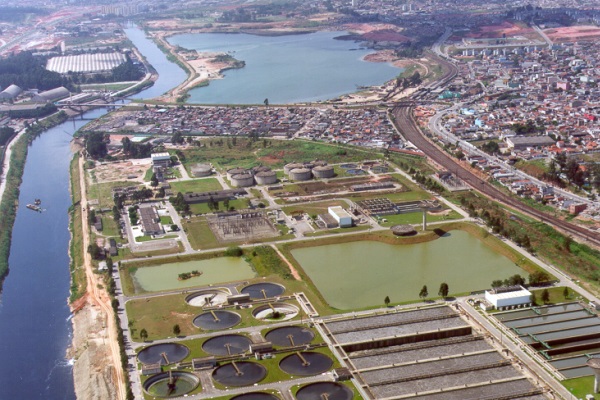
We don´t do much work for property development projects in this sense. We work in the field of drilling, exploration, cone testing i.e. working with the foundations. We carry out some technical controls for some building projects; for example, in Santos we have a branch that is very active in this sector.
Do you have any other branches?
We have a branch in Santos and in Sao Jose dos Campos. We have some well-established offices in Para and in Maranhao but these are not branches as such; they are legal entities. We have such offices in Rio Grande do Sul and in Minas Gerais. They are not yet branches. We only open a branch when a branch is ready to be created. We have projects going on in Para, Maranhao and in Minas Gerais but they have not yet resulted in us opening a branch in these locations. A branch depends on having clients in that area that require such an administrative structure. There needs to be the demand to justify opening a branch. The coastal area of Sao Paulo and the area of Paraiba for example are quite established and developed in this sense and so there is the market and demand for having a branch.
With such growth, how do you see the future of the company in two or three years?
We don´t expect to grow in a huge manner. We simply want to be a specialised company. Being a specialised company demands a very intense technical supervision. Today, we have 250 employees; we should not increase by more than double that and if we do it will be by very little. When a company grows a lot and very rapidly it becomes very difficult to maintain the quality standards and meet client demands.
What advice would you give to a foreign investor considering investing in this sector in Brazil?
I would tell them to come here. It may seem to foreign eyes that we are experiencing a crisis but actually, this is a propitious moment for companies to establish themselves. Because when you come into a country when it is at its peak, there are many more challenges such as expensive raw materials and work force. Today we have a large challenge with work force in all specialisations because there is so much demand but if there was more development going on it would be even harder. That´s why I would say that it is a propitious moment for a foreign company to come to Brazil. People may say that there is not much growth here and that things aren´t doing well, but I would say that we are doing very well. I believe that any company that has a level of specialisation coherent to the demand here will have a brilliant future in Brazil despite the difficulties with bureaucracy and some underdeveloped public sectors. I think this is a phase that every country has to go through to reach the bright side of things.
FAIR USE POLICY
This material (including media content) may not be published, broadcasted, rewritten, or redistributed. However, linking directly to the page (including the source, i.e. Marcopolis.net) is permitted and encouraged.